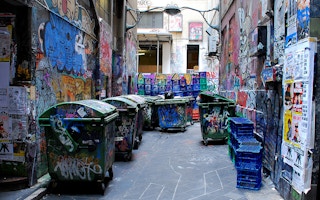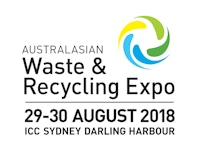In the last 20 years Australia has strived to increase its recycling capacity to meet the increases in waste generation. The most important waste streams, namely organic material, paper and plastics, have all experienced promising increases in landfill diversion
This year there’s been a strong focus on waste and recycling, kicked off by China’s ban on foreign waste products in January and followed by the waste industry suffering the outcome of this decision and scrambling to deal with the crisis. The Chinese ban, which will be fully implemented early next year, affects an annual average of 619,000 tonnes of materials—worth $523 million—in Australia alone.
More recently major supermarkets Coles and Woolworths have made efforts to reduce waste by discontinuing single use plastic bags. However, images of mountains of waste following China’s decision is a chilling reminder of the huge task head. And stakeholders are now facing a changing environment. Recyclers who are unable to ship their waste to China will be forced into more expensive solutions, and may have to negotiate their contracts with local councils so ratepayers could end up fitting the bill. This is one of many critical issues and will be discussed at upcoming industry forum Australian Waste and Recycling Expo (AWRE).
On 29 and 30 August in Sydney experts from the likes of Waste Contractors and Recyclers Association of NSW, Australia and New Zealand Recycling Platform (ANZRP), Local Government NSW, Australian Packaging Covenant Organisation (APCO), Australian Council of Recycling (ACOR) and the National Waste and Recycling Industry Council (NWRIC) will join other industry experts discussing sustainable waste management solutions to reduce, reuse, recycle, recover waste, and strategies and insights to minimise impact and maximise value from waste and meet environmental targets.
Future of recycling landscape
The impacts of China’s restrictions on the Australian recycling industry are being felt across the country. Many industry leaders view China’s decision as a unique opportunity to achieve significant and sustainable change across the recycling sector.
Waste Contractors and Recyclers Association NSW executive director, Tony Khoury, expresses concern over the recent trend of stockpiling unprocessed mixed recyclables, which can pose a risk due to the commingling of contaminants such as batteries and flammable-rated aerosol cans.
“We need new technology to fast-track efficiency and sustainability in the waste management and recycling industry. We also need more collaboration between industry professionals and government leaders working together to help businesses reduce production and disposal costs,” says Khoury.
Korean Environmental Engineering Specialist ACI’s Air Ballistic Separator is one example of such new technology available for industry and consumers to engage with at AWRE next month. It is a hybrid machine that combines Air Shifter and Ballistic Separator to separate many kinds of wastes into various shapes in one machine. In addition, the cartridge filter purifies dust efficiently.
Smarter plastics needed to improve circular economy
UK’s leading plastics expert Dr John Williams from Aquapak Polymers is renowned his views on plastics. Williams acknowledges that the waste management industry today is terrible at disposing of plastics, and urges societies to move towards much more intelligent materials which are not only designed for front-end functionality, but also for back-end circular economy principles of recovery.
With so many changes in the world of plastics over the last 12 months, Williams will be discussing the New Generation of Smart Plastics (plastics that are able to adapt to the environment around them through their sensitivity to a variety of factors such as pH, temperature and intensity of light) and their integration into current waste and recycling programmes at AWRE as part of the event Speaker Series programme.
_0001.jpg?auto=format&dpr=2&fit=max&ixlib=django-1.2.0&q=45&w=680)
Last year’s Australasian Waste & Recycling Expo
“At this crucial point in Australia’s environmental landscape, this forum is vital to explore ways to help minimise the impact and maximise the value from waste in an effort to help build a more stable and sustainable future. A key component of this is looking at how smart plastics meets the needs of the consumer, supply chain and future generations”, says Williams.
True-blue green is the answer to greenwashing
A collective desire for products that don’t harm people or the environment, combined with weariness—and wariness —of greenwashing, is driving a demand for genuinely sustainable products.
Telling authentic green products apart from greenwashed ones can be challenging. Many products that are not eco-friendly—or very minimally—freely boast about being ‘environmentally friendly’ , ‘eco-safe’, ‘all natural’, ‘certified green’, and ‘pure’ in their labelling and advertising, alongside images of pristine landscapes, healthy people, and animals in the wild. These greenwashed products offer no proof of their ‘greenness’ and hoodwink many who want to make better buying decisions.
Global GreenTag has led the way with life-cycle assessment of products by introducing the world’s first LCA (Life Cycle Assessment) -based rating programme which rates products in the building (interiors), health and beauty, cleaning and hygiene paper/packaging and textiles industries in terms of procurement and sustainability factors.
LCARate TM rates products on the impact they make at every stage of their life, from their raw materials and manufacturing processes to the transport, packaging, in-use cleaning and maintenance, and end-of-life disposal and recycling.
Global GreenTag provides different levels of LCARate TM attainment, including Platinum, Gold, Silver and Bronze which not only lets consumers know a product’s life cycle impact level, but gives manufacturers room to improve, and perhaps the motivation to do so.
Find out more about the latest sustainable products most topical trends, developments and strategies on the Australian waste and recycling landscape at AWRE on 29 and 30 August 2018 at ICC Sydney, Darling Harbour. Industry professionals can find out more and register free to attend Sydney’s only waste and recycling industry event.









